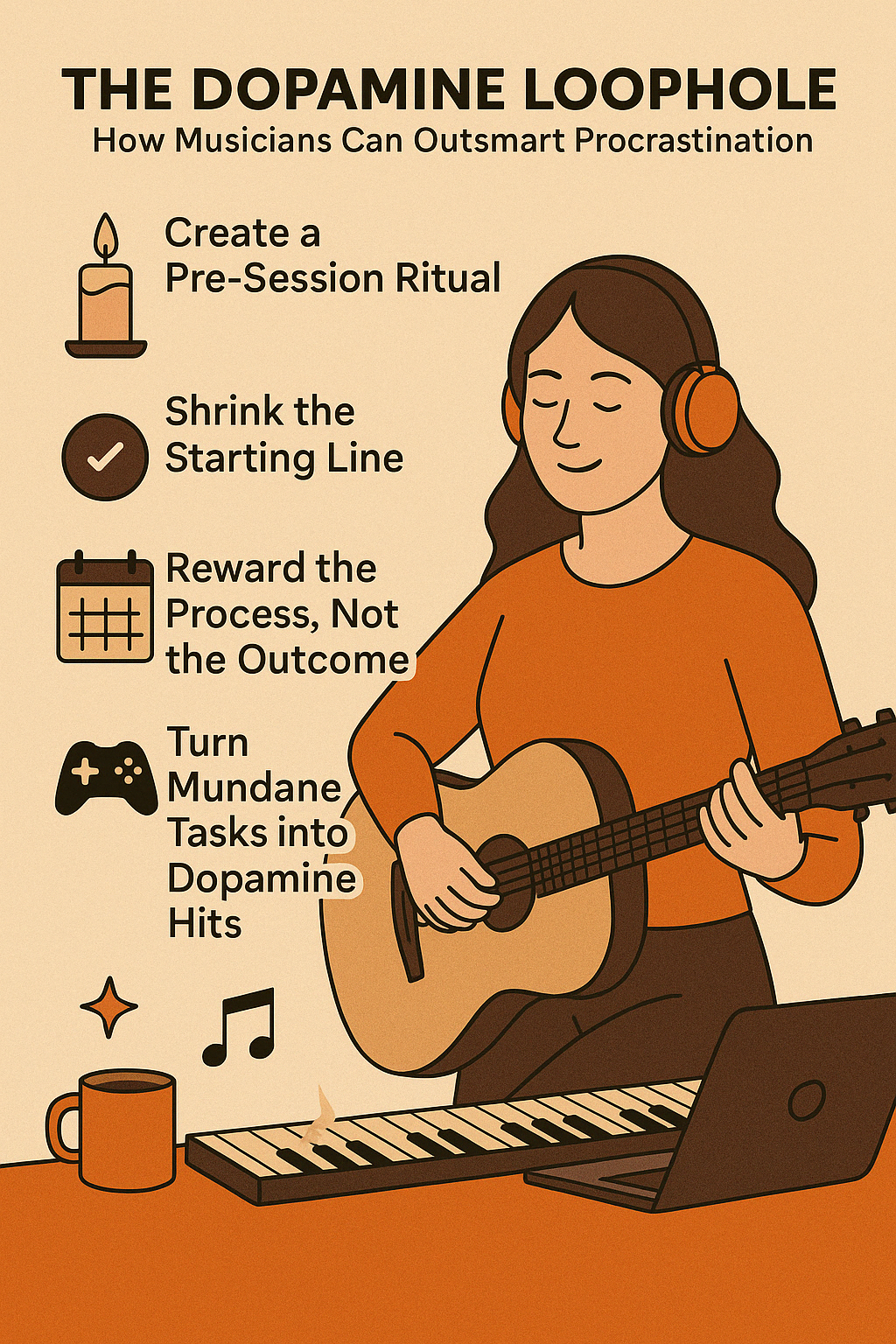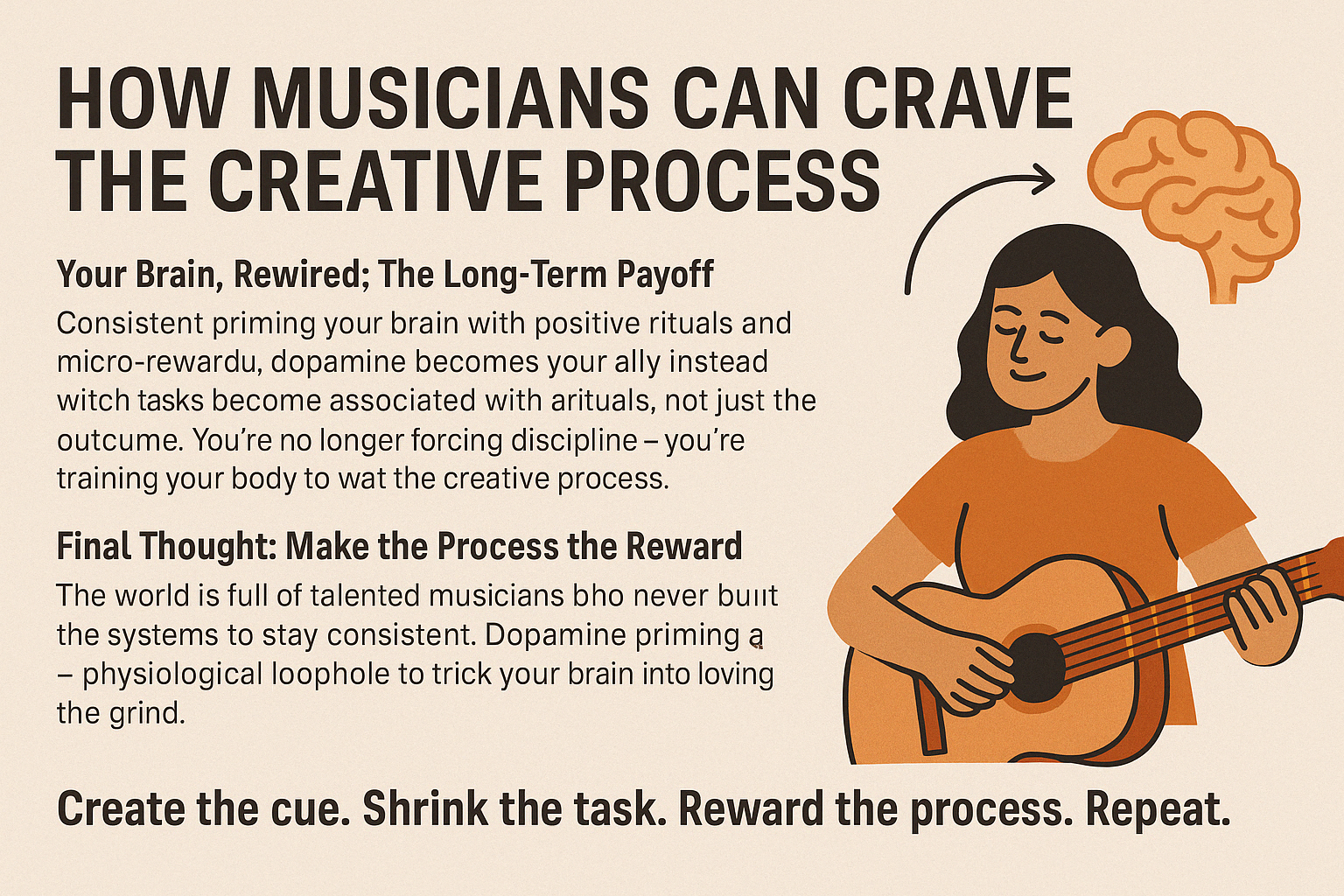Dopamine Hacks for Musicians: Beat Procrastination and Fuel Creativity That Pays
Introduction: Why You’re Not Lazy — Just Miswired
Let's be clear: experiencing procrastination as a musician does not imply a lack of ambition or laziness. More often than not, the problem lies in a gap between your goals and your brain’s built-in motivational system.
That system runs on dopamine — a chemical that drives you toward things that feel rewarding. The trick? Your brain releases dopamine not just for achieving goals, but in anticipation of them.
Understanding this little-known physiological loophole can transform your relationship with self-discipline and unlock a flow of consistent creative output.
What Is Dopamine Priming?
Dopamine priming is the practice of associating a specific cue or ritual with a positive feeling before starting a task. This “primes” your brain to release dopamine in anticipation of action — making it easier to start and stay focused.
Think of it like warming up before a gig. You’re not on stage yet, but the ritual tunes your body and mind for performance.
Why Musicians Struggle with Procrastination
1. 🧠 Perceived Difficulty and Cognitive Overload
What's happening neurologically: When your brain evaluates a task as complex, uncertain, or open-ended (like writing a new song), it activates the prefrontal cortex — the area responsible for decision-making, planning, and self-control. But this part of the brain is resource-intensive and tires easily, especially if you’re not in a well-rested, low-stress state.
Why musicians are vulnerable:
Creative tasks are inherently ambiguous — there’s no “correct” way to write a verse or produce a mix.
Many musicians are self-managed, juggling writing, branding, promotion, and admin — cognitive overload increases.
Overwhelm triggers the amygdala, your fear center, which steers you away from uncertain or emotionally loaded tasks, leading to avoidance.
Translation:
Even though it’s your dream to make music, your brain says, “This looks risky, messy, and unclear. Let’s avoid it for now.”
2. ⏳ Delayed Gratification and the Absence of Immediate Rewards
Dopamine's role: Dopamine is often misunderstood. It’s not the “pleasure” chemical — it’s the motivation and anticipation chemical. Your brain releases dopamine when it expects a reward, not necessarily when the reward is achieved.
Why that’s a problem for musicians:
Finishing an album can take months, with no external payoff until the release.
Tasks like editing tracks, emailing venues, or practicing scales offer no immediate feedback.
The lack of short-term wins causes a dopamine drought, so your brain seeks other sources: Instagram, YouTube, or rearranging your pedalboard.
Translation:
Your brain asks, “Why should I spend hours recording this track if I won’t feel a reward until next year?”
3. ⚡️ The Lure of Quick Dopamine
What’s happening: Every time you check your phone, get a like, or clean something in your studio and feel accomplished — that’s a small dopamine burst. Your brain quickly learns that these tasks offer instant gratification, so it starts to favor them.
Why it’s a trap:
You feel productive without actually advancing your music career.
This pattern strengthens with repetition, building a neural habit loop of distraction.
Over time, starting deep creative work feels harder, because your brain has become conditioned to seek easy dopamine.
Translation:
Your brain says, “Why dive into that emotionally demanding song when I can get a dopamine hit by watching a guitar gear review instead?”
4. 😬 Fear of Judgment, Perfectionism, and Emotional Risk
What's happening emotionally: Music isn’t just work — it’s identity. This means:
Creating feels vulnerable — “What if this song sucks?”
Releasing music opens you to criticism — “What if no one listens?”
Perfectionism paralyzes — “It’s not ready yet.”
These emotional barriers activate the threat response, making your brain perceive creative output as risky. When combined with no deadline or external pressure, avoidance becomes easier.
Translation:
Your brain says, “Let’s protect you from feeling rejected or exposed by not starting at all.”
5. 🧩 Lack of Structure and External Accountability
Creative freedom is a double-edged sword: Musicians often don’t have fixed hours, managers, or project timelines — especially independent artists. This leads to:
Decision fatigue — “Should I write, rehearse, email, or edit today?”
Low urgency — Without external accountability, there’s no pressure to act now.
Underestimating time costs — Musicians often think tasks will take “just an hour,” and delay them endlessly.
Translation:
Without structure, your brain drifts toward the easiest option — which usually isn’t deep, creative work.
🎯 Bottom Line: It’s Not Laziness — It’s Neuroeconomics
Musicians don’t procrastinate because they’re unmotivated. They procrastinate because their brain is making rational decisions based on faulty reward math:
High effort
High emotional risk
Unclear payoff
Delayed rewards
So your brain defaults to safe, easy, instantly rewarding actions.
🔁 What Can You Do?
To reverse this loop, you have to:
Lower the activation energy (make starting easier)
Introduce mini dopamine triggers (rituals and micro-rewards)
Build structure and external accountability (deadlines, collaborations, tools)
Reframe emotional risk as growth, not danger
How to Hack It: Dopamine Priming for Musicians
The key is to attach small, pleasurable rituals to your creative tasks, turning them into dopamine triggers. Here’s how:
1. Create a Pre-Session Ritual
Choose 2–3 sensory cues that you only associate with music-making. Examples:
A specific candle or incense
A “focus” playlist
A drink you reserve just for writing/recording (coffee, matcha, etc.)
Over time, these cues become powerful signals that music is about to happen, and your brain will respond with dopamine — making it easier to start.
2. Shrink the Starting Line
The hardest part of any project is getting started. So make your entry point tiny. For example:
“Open my DAW and load my last session”
“Write 4 bars of melody”
“Write one social media caption promoting a show”
Your brain perceives these micro-tasks as low-effort, which means there’s no resistance to starting. Once you’re in motion, momentum (and more dopamine) takes over.
3. Reward the Process, Not the Outcome
Instead of waiting for the dopamine hit when the song is finished or the show is booked, build in small rewards during the process:
Use a visual progress tracker (a whiteboard, checklist, habit tracker)
Give yourself mini-celebrations after finishing small milestones (like a 5-minute break, quick walk, or a hype song)
Track your streaks — consistency creates compounding dopamine rewards
4. Turn Mundane Tasks into Dopamine Hits
Let’s be real: not every part of being a musician is glamorous. Admin work, practicing scales, booking gigs — these often get pushed off.
Here’s how to reframe them:
Pair them with pleasure: Only allow yourself to binge a favorite podcast while organizing your email list or cleaning your gear.
Gamify the boring stuff: Use apps like Habitica or Forest that turn productivity into a game.
Compete with yourself: Try to beat your last practice time or see how fast you can reply to emails.
🎵 Your Brain, Rewired: The Long-Term Payoff for Musicians
🧠 Neuroplasticity: How Your Brain Learns to Love the Process
The key to long-term change lies in a concept called neuroplasticity — the brain’s ability to rewire itself in response to experience, environment, and repeated behavior.
When you repeatedly use dopamine priming (rituals, micro-rewards, and intentional task design), you're training new neural pathways that associate effort and consistency with pleasure, not pain or pressure.
🔬 The Science:
Hebb’s Law: “Neurons that fire together wire together.”
Every time you light a candle, start a music session, and feel good afterward, your brain is strengthening a connection between starting creative work and feeling good.Dopamine-based habits rely on reinforcement learning. Repetition leads to automatization — eventually, it takes less willpower and becomes more reflexive.
Studies in behavior change show that over time, cue-based habits shift from goal-driven to identity-based — you’re not just someone who does music, you become someone who is a musician who shows up.
🎶 Craving the Ritual, Not Just the Result
In the early stages, most musicians are outcome-driven:
“I want to finish my album.”
“I want to land that sync placement.”
“I want to get 10k streams.”
But outcome-only motivation is fragile. It’s delayed, uncertain, and externally dependent.
What dopamine priming teaches your brain is this:
“I enjoy the act of making music.”
“I crave the quiet ritual that begins my session.”
“I look forward to that little progress win every day.”
Eventually, the process becomes the reward, and your brain starts to seek the ritual itself. This is the exact moment you transition from forcing discipline to feeling pulled toward your work.
🔁 You Build a Self-Trust Feedback Loop
Musicians often struggle with self-trust:
“Will I actually finish this?”
“Can I stick to a plan?”
“Why do I always lose momentum halfway through?”
Dopamine priming creates micro-evidence every day that says:
✅ “I showed up.”
✅ “I took one step.”
✅ “I made progress.”
Over time, this compiles into internal trust — the belief that:
You don’t have to feel motivated to start.
You don’t need perfect conditions to create.
You are someone who follows through.
That belief is career-altering.
🛡️ You Build a Mental Immune System Against Procrastination
When your rituals, cues, and rewards become habitual:
Resistance shrinks
Excuses lose power
Starting becomes frictionless
Procrastination thrives in uncertainty, overwhelm, and negative emotional associations. Dopamine priming builds predictability, reward, and confidence into your workflow. That’s like installing an immune system that protects you from avoidance behaviors.
You don’t waste as much energy fighting yourself.
You conserve willpower for your art — not for fighting distraction.
🎯 Final Thought: The System Wins
The music industry is not short on talent. It’s short on follow-through.
And the artists who win are almost never the ones with the most raw ability — they’re the ones who built systems that help them keep going.
This is what dopamine priming gives you:
A system that makes showing up feel good
A structure that reduces resistance
A strategy that makes motivation inevitable
You don’t need to be superhuman.
You just need to design your world so that progress is the default.
🔁 Your Dopamine Priming Formula:
Create the cue (ritual)
Shrink the task (make it tiny)
Reward the process (celebrate small wins)
Repeat (let the wiring happen)
Do this long enough, and your brain will work for you instead of against you.


